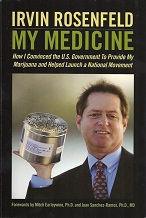There is no scientific basis for tests to measure if a driver is under the influence of marijuana, a landmark study claims.
Unlike the simple breathalyzer test for alcohol, time-consuming hospital blood tests are used as the gold standard in six states to test for marijuana.
But in fact the results of the complex, time-consuming, and expensive tests often mean nothing, according to a study released on Tuesday by the AAA's safety foundation.
Cannabis stays in the system for up to a month, meaning it is impossible to know if a driver smoked hours ago or weeks ago. And some users could be far more affected by a small amount than others.
Most of the time the officer has no choice but to let people continue on their way - possibly driving under the influence - instead of getting a warrant to take them to hospital.
It would be more safe, the AAA claims, to scrap those laws and let specially-trained police officers make their own judgement based on indicators such as pupil dilation, tongue color and behavior.
Drivers with a blood-alcohol level above 0.08 are deemed legally impaired.
In many states that have legalized cannabis drivers are deemed over the limit if they have 5 nanograms of THC per milliliter of blood.
But marijuana and alcohol are metabolized different, the AAA warns.
It means a driver with low blood-levels of THC - the chemical that makes users high - could still be a serious risk behind the wheel if they aren't a regular user.
Meanwhile a regular could be fine with copious levels of THC in their system.
Yet the laws in five of the six states automatically presume a driver guilty if that person tests higher than the limit, and not guilty if it's lower.
As a result, drivers who are unsafe may be going free while others may be wrongly convicted, the foundation said.
reference: http://www.dailymail.co.uk/news/article-3582408/Scientific-basis-laws-marijuana-driving-questioned.html
Latest
Coronavirus Strikes Massachusetts Cannabis Company Employees
Reassessing the Essential: Cannabis in the Time of a Pandemic
5 Reasons To Try Aspen Valley CBG Flower (30% Off)
High Times Cannabis Cups Go Virtual In Wake Of Coronavirus Pandemic
Drug Enforcement Administration Proposes Plan To Expand Cannabis Research
Ghana Legalizes Cannabis For Medicinal And Industrial Uses
The cheapest legal weed in Canada: Discover these cannabis ‘value brands’
Cannabis and coronavirus: Here’s what you need to know
cannabis designs
The Best Of
WHO Rules CBD Should Not Be a Scheduled Drug

Dr Cristina Sanchez PhD video interview on medical marijuana and cancer

Biochemist Dennis Hill interview; Cannabis oil as a cure for cancer.

The unofficial World Record holder for cannabis smoking part 1




